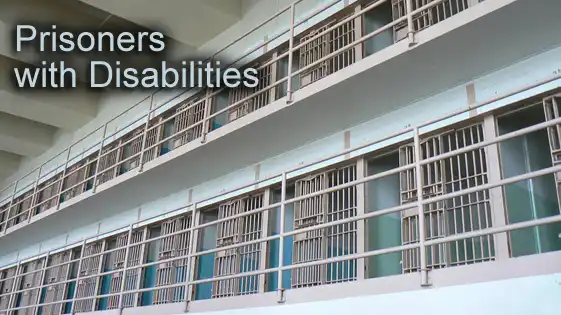Prisoners with Disabilities – Discussion from a Social Security disability lawyer
Being incarcerated is a highly challenging experience for anyone. But for prisoners with disabilities the system is particularly unforgiving.
Author Attorney Lloyd Bemis:
America has the highest incarceration rate in the world, with 693 prisoners per 100,000 people. People in prison are three times more likely to be disabled than the general population.

Prisoners with Disabilities. Being incarcerated is a highly challenging experience for anyone. But for the disabled the system is particularly unforgiving.
About one third of inmates have some sort of disability and over half have a mental health problem of some kind.
Prison is not an easy place for anyone, and it’s not supposed to be. However, lack of access to mental health care has caused the mentally ill to end up in prisons which are unable to accommodate their special needs.
According to 2004-2005 data, there are three times as many persons with serious mentally illnesses in prison than in hospitals.
21% of inmates suffer from depression, and 12% suffer from bipolar disorder. The practice of imprisoning the mentally ill is particular prevalent in rural areas, where access to mental health treatment is inadequate. The majority of mentally ill inmates are put in prison for minor drug-related offenses.
Prisoners with disabilities such as mental illness face worse treatment in prison.
Prisoners with disabilities are more likely to be placed in solitary confinement in order to segregate them from the other prisoners. Solitary confinement has been shown to exacerbate existing mental conditions and perhaps cause mental problems in otherwise healthy individuals. Mentally ill prisoners are frequently isolated and discriminated against, often being restricted from entering special programs such as those for vocational training or substance abuse abatement. Thousands of cases alleging ADA violations have been filed against prisons, but it is difficult for an inmate to present their case successfully. Additionally, prisoners with mental illness are far more likely to experience abuse and mistreatment from guards, and twice as likely to be sexually assaulted.
Suicides are a major problem, particularly in county jails where suspected criminals first come into contact with the justice system.
42% of suicides in county jails occur within a week of arrest. When a new prisoner arrives at jail for the first time, they undergo a mental and physical examination. If they are at risk for harming themselves, they are supposed to be put on suicide watch, but often are not (as was the case in the famous Sandra Bland incident). Nearly a third of those who die in prison take their own life.
Healthcare is simply inadequate in prison, and correctional officers are often untrained in how to handle prisoners with disabilities special needs.
There have been multiple reports of prisoners with ambulatory issues being denied access to assistive devices and being forced to crawl. One story from New Mexico describes a situation where a man was not allowed to have his prosthetic leg and had to hop around.
If you have been incarcerated for more than a month you will need to reapply for disability benefits. Contact an experienced Social Security disability lawyer at 512-454-4000 for help.
Another serious issue that disabled people often face when they go to prison is lack of support from the outside.
Unfortunately, Social Security will not pay benefits to an individual who is incarcerated. If you are currently receiving Social Security Disability Insurance (SSDI) or Supplemental Security Income (SSI) and you go to prison or jail for over a month, you will lose your benefits and you will have to reapply upon release.
Social Security benefits are often an essential means of financial support for disabled individuals. However, it can be difficult to get on benefits because the Social Security Administration denies two-thirds of initial applications. If you have applied for Social Security Disability benefits and been denied, contact the Law Office of Bemis, Roach and Reed for a free consultation. Call 512-454-4000 and get help NOW.
Try these links for further reading on this subject:
Do I have to go to the lawyer’s office to get help with SSDI?
What if the SSDI beneficiary is not capable of managing their benefits?
Disabling Conditions- List of impairments


Your Free Initial Consultation
Call now:
At Bemis, Roach and Reed, if we can't help you, we will try to find the right attorneys for you.
We offer each of our prospective clients a free no obligation one hour phone or office consultation to see if we can help you and if you are comfortable with us. We know how difficult a time like this can be and how hard the decisions are. If we can be of assistance to you and help you find a solution to your issue we will, even if that means referring you to another attorney.
Let's get you Started:
If you could provide us with some basic information about your claim we will get right back with you with a free case evaluation and schedule your Free Consultation Today.
You can also email us at: contact@brrlaw.com
Kind Words from Our Clients
“The attorneys and staff at Bemis, Roach & Reed have provided me and my husband, Jeff, with stellar advice, care, and service. They made navigating the SSDI process easy, painless, and as timely as possible. During this difficult time in our lives it was a tremendous relief to know they were on our side and keeping us updated on next steps and timelines. We also had questions about my husband’s long term disability insurance and they helped us get those questions answered and resolved without any additional fee. I highly recommend Bemis, Roach & Reed.” – Kelli G
“I needed a lawyer for my case and had googled best lawyers. They came up first on my list and decided to give them a call. From the moment I called I knew I chose the right people. They said they would fight for me and fight they did. They knew what they were doing and kept good communication throughout the process. If you need someone that will listen, understand, and fight then these are the people. HIGHLY RECOMMEND.” – Marcel L.
“I’ve had a great experience working with Bemis, Roach & Reed for my disability case. I spent two years fighting on my own, until I was informed to look for a disability lawyer. Right away, sending in questions was a breeze, and from the moment my case was accepted, everything became a major weight off my shoulders. My newest appeal was filed for me, my medical records and case history sorted for me, and I could finally focus on my appointments and treatment with a little less worry. Everything was explained to me in a way that made sense, the process was set out in an easy to understand way. And, just like that, at the beginning of July 2023, my claim was accepted!” – Sunshinemutt






